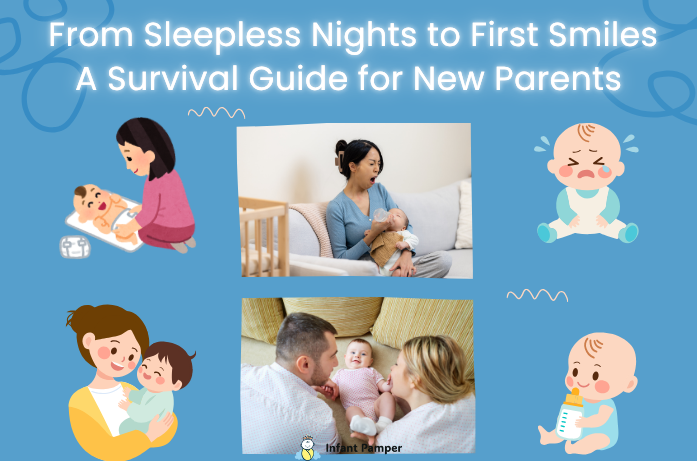By the Infant Pamper Team
Welcoming a newborn into the world is magical and exciting, but let’s be honest, it’s also a big adjustment. As soon as your little one arrives, you’re launched into sleepless nights, endless cuddles, and unforgettable firsts. Whether you’re a first-time parent or adding another baby to your family, this newborn survival guide for parents is here to help.
At Infant Pamper, we know the early days can be overwhelming. This guide offers practical newborn care basics, emotional support, and tips for first-time parents with a newborn, because you don’t have to figure it out alone.
1. Sleep Deprivation Tips: How to Survive Sleepless Nights as a New Parent
One of the biggest challenges new parents face is disrupted sleep. The American Academy of Pediatrics (AAP) notes that newborns sleep 14 to 17 hours a day, but not in long stretches. Their circadian rhythms aren’t developed, so they wake frequently for feeds during the first 6–8 weeks.
Coping with sleep deprivation as a new parent:
- Sleep when your baby sleeps: Short naps help restore energy.
- Share night duties: Take turns feeding and changing diapers.
- Limit screen time before bed: blue light disrupts rest.
- Reach out for help: Family, friends, or a postpartum doula can support you.
Take care of your mental health. Lack of sleep can seriously impact your mood and emotional health. If you’re feeling constantly upset or anxious, talk to your health care provider. Support groups and trusted resources like Postpartum Support International are also available to help.

2. Feeding Tips for Newborns: Breastfeeding, Formula, or Both
Feeding is a major part of newborn care essentials, and there’s no one “perfect” method. The key is that your baby is fed and thriving.
- Breastfeeding: The World Health Organization (WHO) recommends exclusive breastfeeding for 6 months. Breast milk, often called “liquid gold,” is rich in antibodies and adapts to your baby’s needs. Support is available from La Leche League International and International Board Certified Lactation Consultants (IBCLC).
- Formula Feeding: Modern formulas are safe and designed to support growth and development.
- Combination Feeding: For flexibility, many parents use both. For guidance, visit KidsHealth or consult an IBCLC for personalized tips.
Helpful Hint for Parents: Whether you’re breastfeeding, bottle feeding, or both, track your baby’s feeds and diaper changes. A general rule of thumb: 6+ wet diapers a day is a good sign that your baby is getting enough food.

3. Newborn Milestones in the First 3 Months
Amid sleepless nights, your baby will start showing exciting signs of growth. Common milestones include:
- First smiles (6–8 weeks)
- Coos and babbles
- Pushes up during tummy time
- Hands to mouth
The Centers for Disease Control and Prevention CDC Milestones offers milestone checklists to track development. If you’re concerned, speak with your pediatrician.
4. Diapering Tips for First-Time Parents
Expect 8–12 diaper changes per day in the first weeks. Make it easier with these tips:
- Use fragrance-free wipes or warm water for sensitive skin (HealthyChildren.org, AAP resource).
- Apply a barrier cream every change to prevent diaper rash.
- Give your baby diaper-free time daily.
- Track poop color and consistency; drastic changes may need a pediatrician’s advice.
5. Soothing Techniques for a Crying Baby
Crying is normal, but stressful. Try the 5 S’s method by Dr. Harvey Karp, a trusted pediatric approach:
- Swaddle (secure, arms in)
- Side or Stomach (for soothing only, never for sleep)
- Shush (white noise mimics womb sounds)
- Swing (gentle motion)
- Suck (nursing or pacifier)
Bonus Tip: Baby-wearing often calms fussy babies and frees your hands. If crying exceeds 3+ hours/day, 3+ times a week (possible colic), consult your pediatrician.
6. Baby Care Basics You Didn’t Know You’d Need
- Umbilical cord care: The AAP recommends keeping it clean and dry; it usually falls off within 1–2 weeks.
- Bathing: Stick to sponge baths until the cord heals; 2–3 baths a week is plenty.
- Nails: Trim while baby sleeps using a file or clippers to avoid scratches.
7. Baby Bonding Activities for New Parents
Bonding might take time, and that’s normal. Here’s how to build connection:
- Skin-to-skin contact (endorsed by AAP for calming and bonding)
- Eye contact during feedings
- Talking and singing
- Baby massage (promotes relaxation and bonding)
Final Thoughts: You’re Doing Better Than You Think
Parenthood in the early days is tough, messy, and beautiful. Every diaper change, every cry soothed, and every smile proves you’re doing an amazing job. Take photos, laugh often, and forgive yourself on the hard days.
At Infant Pamper, we’re more than a website; we’re a community of parents walking this journey together.
✅ Frequently Asked Questions (FAQ)
Q1: How long should newborns sleep at a time?
A: Usually in 2–4 hour stretches. The National Sleep Foundation notes this improves with age.
Q2: How do I know if my baby is eating enough?
A: According to the AAP, 6+ wet diapers a day is a good sign.
Q3: What newborn milestones should I expect in the first 3 months?
A: First smiles, cooing, and tummy time strength are typical (CDC Milestones).
Q4: How do I cope with sleepless nights with a newborn?
A: Nap when the baby naps, share duties, and ask for help from family or postpartum professionals.
Medical Disclaimer: This article is for informational purposes only and is not a substitute for professional medical advice, diagnosis, or treatment. Always consult your pediatrician with any questions regarding your baby’s health.




